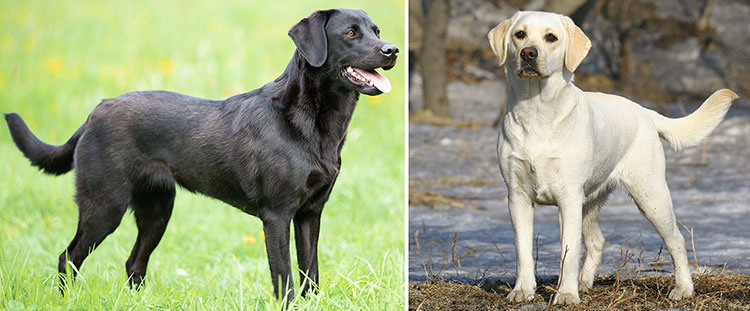Labrador Retriever Breed Profile

KC Group Gundog
Size Large
Weight Around 25 - 34kg
Height Dogs: 56 - 57cm; bitches: 55 - 56cm
Average lifespan 12 years
Good with children? Yes
Good guard dogs? Would bark
Moulting level Medium
Grooming Light
Exercise requirement Lots
Jogging partner Yes
Colours Black, yellow, and chocolate/liver
Temperament A real gentleman; good-tempered, kind, intelligent, and eager to please
Labrador Retriever Breed Profile
Labrador health
Labs are prone to the following conditions:
- Hip dysplasia.
- Elbow dysplasia.
- Osteochondritis dissecans (OCD).
- Progressive retinal atrophy (PRA).
Hip dysplasia, elbow dysplasia, and OCD affect the hip, shoulder, and elbow joints; PRA is an eye condition that results in blindness.
It's absolutely essential that the parent dogs of any puppies you view have had relevant health checks, namely that they've been hip scored, elbow scored, and eye tested. A breeder should have documentation to prove these tests have been done; make sure you see it.
Hip scoring
The left and right hips are X-rayed and scored individually; the final hip score is the two individual scores added together.
The lower the score, the better. The average hip score in Labs is 16; anything higher is considered poor and the dog shouldn't be bred from.
Elbow scoring
Each elbow is X-rayed and scored between zero and three; zero being excellent and three indicating the most severe problems. Only dogs with a zero score on each elbow should be bred from.

Labrador temperament
- Kind natured.
- Good with children and other animals.
- Revels in company and loves being part of the family.
- Happy to be left home alone for short periods but no more than four hours.
Labrador lifestyle
- Ideal family pet.
- Will thrive if you enjoy an active lifestyle.
- A garden is a must.
- Needs a considerable amount of exercise - at least two good off-lead walks a day.
- Won't thrive in an urban environment without regular access to off-lead walks.
Labrador trainability
- The Lab is a fantastic all-rounder - you name it, he'll most likely be able to do it.
- Extremely easy to please and will excel at training.
- Training classes will get the best out of your Lab.
Labrador general care
- Very easy to look after.
- The Lab's short coat doesn't require a lot of grooming.
- The Lab is a notorious food lover who will eat anything!
- Be strict with portion sizes as they gain weight easily.
What is the difference between a working and show Labrador?
Working Labs are more energetic than show-bred Labs and tend to be of slighter build; show Labs are more stocky.
While working Labs are often cheaper, it's important to remember that it's best not to choose a working Lab unless you intend to work him
Pros
- Highly trainable.
- Minimal grooming.
- Good temperament.
- Good all-rounder.
Cons
- Some hereditary problems.
- Needs a good deal of exercise.
- The Lab loves food and is ruled by his stomach, so you'll need to be extra vigilant with feeding.
- Take extra care when your pup is young to ensure healthy bone development.

